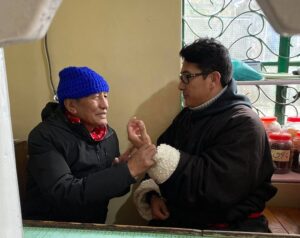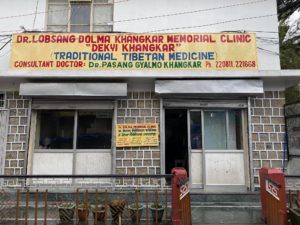
Doctor Thokmey reading a patient’s pulse
Photo: Contact
Amchi Thokmey [Amchi is the Tibetan word for Doctor] has become a household name at Dr Lobsang Dolma’s Memorial Clinic. I went to see him at the clinic at Dolma Chowk, McLeod Ganj, Dharamashala. The small clinic is always buzzing with patients from all parts of India and local Tibetans going in and out the whole day. It has been 42 years since Thokmey joined this clinic – initially to practice and gain experience in the field of Tibetan medicine – and he assures me that he has no plans to leave his work yet, saying this is how he finds ways to help people who are less fortunate.
Thokmey was born in a place called Kyunglung Ngulkhar in the Ngari region on the northern side of Tibet. He came into exile in 1959 at the age of eight or nine with his whole family, arriving in Ladakh where he settled for several years. Later, in 1965, his family, along with other Tibetans, moved to Manali. As a child, Thokmey studied Tibetan with a Bon Lama [Bon is the traditional religion of Tibet]. He then studied Tibetan medicine in the 1970s with Kungo Bashi Wangyal, a renowned former teacher at Men-tsee-khang, an institute based in Dharamshala who’s objective is to preserve, promote and practise Sowa Rigpa, the ancient Tibetan system of medicine, astronomy and astrology. Later he studied under Lobsang Dolma Khangkhar, a much loved and revered doctor who was then the owner of the clinic, now known as the Memorial Clinic, and who was known for treating many cancer patients. He told me that now the clinic is run by his teacher’s daughter, Dr. Passang Gyalmo. Thokmey said with a heavy heart that his teacher passed away just when she was at the peak of her profession.

Dr Lobsang Dolma Khangkar Memorial Clinic at Dolma Chowk, Mcleod Ganj
Photo: Contact
For ten years Thokmey served as the member of the Tibetan Parliament representing the Bon religion. With a big, calm smile on his face, Thokmey says that he failed in politics, saying he feels that his efforts throughout his tenure achieved no concrete results. He speaks passionately about how he has always been a free Tibet campaigner. “We should fight for a free Tibet (Rangzen) and it is our right! When I say fight, I don’t necessarily mean that there should be a war,” he continues, “These days, non-government organisations are holding marches, but only within India. No one will stop you and there is no impact. These marches should aim to enter Tibet – even though it is obvious there is no chance of getting into Tibet – at least the goal and attempt should be that, and it will create some ruckus and get international attention.” He stresses that these organisations’ focus shouldn’t be on reports of what they have done during the year or their term of office, but rather on the effectiveness of their programmes in keeping the cause of Tibet alive by garnering more international attention.
As I asked him about him being among the first generation of Tibetans to come into exile, he recalled that back then Cholsum Unity was the only Tibetan organisation, apart from the Central Tibetan Administration, and said he had worked as its executive member for ten years. He believes that although the hard work of his generation of Tibetans has not resolved the Tibetan independence movement, they have built a strong community in exile for today’s generation. He expressed sadness over the fact that today every Tibetan seems to leave and move on to the West and fears that the foundations his generation built in India could soon collapse.
I asked him if he has any quick tips for better health. He laughed off my question, and answered, “food habit.” He continued, “If you eat too much and sleep, you will get sick for sure, even if not immediately.” He explained that one needs to divide the stomach into four parts: use two for food; one for water or tea and one part should be left empty – there should be a space for circulation. He said the philosophy of Tibetan medicine “should be introduced into Tibet schools”. For the younger generation of Tibetans, he urged them to follow His Holiness the Dalai Lama’s messages, work on the unity of Tibetans and on the preservation of Tibetan culture and tradition.
With the nature of his profession, I asked him if he experiences anxiety when hearing about the numerous illnesses affecting our community. “No”, he told me, “We know that there are preventative methods, precautions and solutions for all illnesses. That’s what I have studied.”




 Print
Print Email
Email













